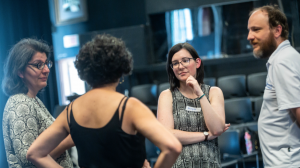
Augusto Boal’s Forum Theatre
Conflict Theatre arose from the development of Forum Theatre, or Theatre Of The Oppressed, by Brazilian activist Augusto Boal. This work has been adapted locally by David Diamond (Theatre for Living) who offers this helpful description of Forum Theatre: “In Forum Theatre, we show the audience the play all the way through once — the play builds to a crisis, and stops, offering no solutions. The play is then performed a second time, where audience members cand then stip the action and enter the stage themselves, by replacing characters with whom they identify and try to solve problems of issues inside the story. The rest of the cast stays in character and improvises. […] The theatre becomes a creative laboratory where we can try ways to transform ourselves, our communities, and the world.” (www.theatreforliving.com)
We call what we do at UBC, Conflict Theatre rather than Theatre of the Oppressedor Teatro de Oprimidobecause, in our minds, it is different and distinct from Boal’s practice and we do not wish to misrepresent his work. It is not a case of using different names to indicate the same “it” but, in fact, the use of different names for different distinct, but deeply related, practices.
Conflict Theatre @ UBC
We implemented Boal’s core concept — improvement through practice — into the UBC workplace, where we host workshops and events such as Cops In The Head, Rainbow Of Desire, and Conflict Theatre Performances to interact with conflict in radical and inclusive ways. Building on the tradition introduced by Augusto Boal and developed on by David Diamond, Conflict Theatre @ UBC continues to practice and innovate. Read more about our upcoming events!
Our work does not exist without Boal and we try to take every opportunity we can to acknowledge our endless indebtedness to him. We use a different name for our work not to distance ourselves from Boal but to honour what I believe his wishes were regarding his legacy as we have gleaned them from his writing and the writing of those who worked with him.
In an interview with Barbara Santos, she talks for quite a while about the use of Theatre of the Oppressed methods in various contexts and when it is, in her view, appropriate or not appropriate. Below, is a short excerpt from this longer section in which she is specifically addressing the use of Theatre of the Oppressed in a “private enterprise” context. While the university is, of course, not a private enterprise, but it is, most definitely, a place that wields great power and privilege which happens to be putting some of its HR resources into this program. The overlap between private enterprise and the university of sufficient magnitude to heed the warning from Barbara Santos below:
The Theatre of the Oppressed’s task is to reveal the structure of the conflict and allow for the possibility of analyzing the particular case as an example of the social, economic, and cultural system in which it is embedded.. […] To do shows to create awareness of the need to prevent workplace accidents, the importance of respectful relationships in the work environment, the appropriate use of tools and resources, in addition to other well-intentioned subjects is certainly praiseworthy. To call that Theatre of the Oppressed is absurd. In such cases, to use techniques like didactic theatre, theatre for commercial applications, Theatre-in-Education or to create some type of theatre as commodity is more appropriate, fair and ethical. (quoted in InExAct Art by Birgit Fitz)
In our reading, even the adapted version of Theatre of the Oppressed that we do in the above context would be suspect in the eyes of Barbara Santos. For us, an essential part of remaining defensible to critics from the international Theatre of the Oppressed community is to very intentionally not refer to what we do as Theatre of the Oppressed. Again, not to try and claim a kind of ownership of the practice that diminishes Boal’s legacy, but rather to protect it from misrepresentation to those who might feel they are encountering “it” for the first time through exposure to Conflict Theatre.